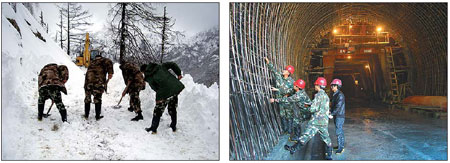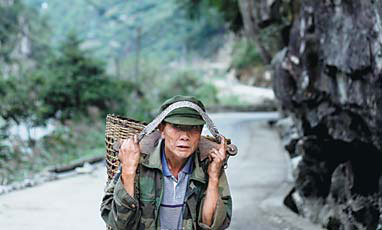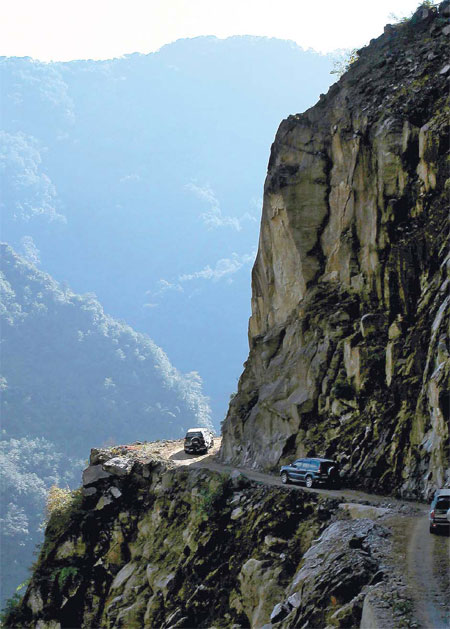Tackling mountain of difficulties
Updated: 2013-02-08 07:39
By Hu Yongqi and Li Yingqing in Yunnan (China Daily)
|
||||||||
|
|
|
|
 Below left: Heavy snows usually cut off Dulongjiang township from the outside world for six months every year. Below right: Workers building a tunnel linking Gongshan and Dulongjiang township. Photos by Zhu Yong / for China Daily |

Since December, Gaoligong Mountain National Nature Reserve in Yunnan province has been covered by heavy snow up to 10 meters deep. The road that winds around the mountain to the county seat of Gongshan in Nujiang Lisu autonomous prefecture has been inaccessible to traffic.
The only sign of human habitation was a row of makeshift houses, built halfway up the mountain three years ago, and facing northern Myanmar. Most of the dwellings were empty and only one person was in evidence; Zhou Yong, the project manager in charge of the western part of a new tunnel being drilled through Gaoligong Mountain.
"It's traditional for most of the Chinese workers to go home to see parents and relatives during Spring Festival. All the staff have been permitted to take the break, so I have to stay to keep an eye on the machinery and facilities," he said. Although many of his co-workers were already en route to their homes, as project manager, Zhou was left with no choice but to remain on site, even though he missed his family, 2,000 km away in Jiangsu province.
In March 2011, the government of Nujiang prefecture began a project to build a tunnel and an asphalt road from Gongshan to Dulongjiang township, where people from the Derung ethnic group account for 70 percent of the population. The town is notorious for being inaccessible for six months of the year, cut off from the outside world by heavy snowfalls.
Zhou has been working on the tunnel for three years. It's a vital part of the upgrading of the local infrastructure. When it is completed next year, the tunnel will cut the distance between the township and Gongshan county to 76 km from the present 96, and the journey time will be reduced to two hours from six.
Gaoligong Mountain is a microcosm of the natural conditions in Yunnan: 84 percent of its 394,000 sq km is mountains and hills. Only 6 percent is bazi, a local word for flatland or plain, meaning that the region's highways traverse innumerable bridges and tunnels.
Technicians such as Zhou have to overcome the harsh natural conditions to complete their tasks. Along with hundreds of construction workers, they're working to improve the local transport system and to promote regional economic development.
Dangerous, but essential
In the past 13 years, Dulongjiang has seen a significant change in traffic volume. Before the dirt road was built in 1999, connecting the mountain with Gongshan county seat, local people were unable to afford the horse-drawn carriage, and were forced to climb over the snowcapped hills in winter if they wanted to visit the town.
The State-owned horse caravan that carried all the goods into the township was disbanded in 1999. The snaking road winds up to an altitude of 3,900 meters before plunging down to Kongdang village, where the township government is based. The road was blocked when snow 10 meters deep blanketed the mountaintop from December to June. Many passengers complained that traveling on the road made them severely nauseous.
However, in the old days before the road, most travelers had to walk. "When I reached the top of the mountain, I slipped over the snow like a skier once I'd tucked my trousers into my socks to stop the snow getting into my clothes and melting. But it could be perilous; if I didn't pay enough attention to where I was going, a collision with a tree might be my 'reward'," said Yang Song, a former soldier.
Yang, 35, once spent 14 hours jogging and walking to Gongshan to attend an urgent meeting. Unsurprisingly, his feet were bleeding badly when he eventually reached his destination.
In 2009, President Hu Jintao and Premier Wen Jiabao urged further improvements in transportation for the Derung people in Dulongjiang. The new tunnel was among a number of projects given top priority by the provincial government.
Between August and October 2010, Zhao Yabo, a senior engineer at Broadvision Engineering Consultants, Yunnan's largest enterprise specializing in transportation research and design, headed a team of 50 technicians who pinpointed the best location for the tunnel by conducting a series of geological tests, or prospects, on Gaoligong Mountain.
"We had to trudge to the mountaintop because there was no road to the spots where we were going to drill for rock samples. Local workers laid trees on the slippery ground to make steps so they could carry the machines to the top," said Zhao.
Zhao hired 50 workers in Gongshan county to transport a drilling machine, weighing 15 metric tons, from the foot of Gaoligong Mountain to the highest drilling point. It took 20 days, he said.
"Gaoligong Mountain is a place where warm air from the Indian Ocean meets cold air from the Pacific and forms rain. Therefore, the humidity was too much for us. Our clothes were soaked all the time and we all huddled around a fire made from small pieces of kindling whenever we had a short break," Zhao said.
One technician, Zong Cong, tripped over a rock near a cliff edge while scrambling to a higher spot. Fortunately, a co-worker caught his hand and pulled him back. "One slide might have been fatal, it could have taken his life," said Zhao.
An assistant engineer, Li Xian, had to rely on his fellow engineers to guide him over the rugged rocks with a safety rope, after an arm he broke years before he was assigned to the mountain proved too weak to let him climb alone.
During his 24-year career, Zhao has participated in prospecting work for highways the length and breadth of Yunnan, but he described the work on and around Gaoligong Mountain as the most difficult he had ever faced professionally.
The Gaoligong Mountain tunnel will be 6.8 km long when completed, making it the longest in Yunnan's history. It and the road-asphalting project required combined investment of 609 million yuan ($98 million) from the provincial government.
The prospecting process for the tunnel reduced the cost by at least 200 million yuan, according to Lu Zhiqiang, deputy general manager of Broadvision Engineering Consultants. Finding an optimum site for drilling can make the job go more easily and requires less spending.
Every year, Broadvision Engineering can earn 100 million to 200 million yuan in prospecting contracts, mostly for expressways or highways, said Lu. As of 2009, the consultancy had completed the prospecting work for 4,863 bridges and 239 tunnels.
Lu was involved in the prospecting work at Gaoligong Mountain in 1991, preparing for the construction of the dirt road. At that time, Lu and his colleagues slept in hammocks, sheltered under one piece of tarpaulin. Firecrackers were a prerequisite for the team, helping the men scare away black bears and wild cattle that might attack if they felt their domain was being invaded, he said.
"For a prospecting team, there is no harder work. Every year, we encounter harsher and harsher conditions," he added.
Worker shortage
Two construction teams are working on the tunnel simultaneously. Zhou said his team has completed 1.4 km so far. But compared with the tunnel he helped build in Medog county in the Tibet autonomous region, he said this one is much harder because of the complicated rock formation and frequent shortages of food, fuel and construction materials.
"Too much water oozes from rock that has an extremely unstable formation and is hard to drill. Also, we are forced to stop work when blizzards come, because of worker safety. This means we can only proceed for six months of the year," said Zhou.
Last year, an excavator was crushed when part of the tunnel collapsed. Fortunately, none of the workers was badly injured, he said. The construction site didn't have electricity, and so five diesel generators worked all day to power the machines.
"It's tremendously difficult for us when the machinery breaks down. We couldn't find the right components immediately because the county seat is 50 km away and we were always running out of backups. Now, we always have two machines of the same model and replace the parts from one to the other," said Zhou.
A shortage of construction workers poses another problem for the engineers. Zhou's team has 36 technicians but also needs 100 migrant workers. In the past 18 months, 600 men have worked on his team, but 90 percent of them quit without notice because they couldn't bear the hardships and potential danger.
"Very often, I saw a worker asleep at night, but couldn't find him the next morning," said Zhou. "Then his co-workers would tell me that he left without taking any luggage. You can see how afraid some of the workers are."
When the road was blocked earlier this winter, the men stored and ate cabbages and radishes, the only vegetables they could obtain.
"No matter how hard the job is, I will continue with my work and complete the tunnel to the best of my ability," said Zhou.
Guo Anfei contributed to this story. Contact the reporters at huyongqi@chinadaily.com.cn

 In Photos: 7.0-magnitude quake hits Sichuan
In Photos: 7.0-magnitude quake hits Sichuan
 Li Na on Time cover, makes influential 100 list
Li Na on Time cover, makes influential 100 list
 FBI releases photos of 2 Boston bombings suspects
FBI releases photos of 2 Boston bombings suspects
 World's wackiest hairstyles
World's wackiest hairstyles
 Sandstorms strike Northwest China
Sandstorms strike Northwest China
 Never-seen photos of Madonna on display
Never-seen photos of Madonna on display
 H7N9 outbreak linked to waterfowl migration
H7N9 outbreak linked to waterfowl migration
 Dozens feared dead in Texas plant blast
Dozens feared dead in Texas plant blast
Most Viewed
Editor's Picks

|

|

|

|

|

|
Today's Top News
Live report: 7.0-magnitude quake hits Sichuan, heavy casualties feared
Boston suspect cornered on boat
Cross-talk artist helps to spread the word
'Green' awareness levels drop in Beijing
Palace Museum spruces up
First couple on Time's list of most influential
H7N9 flu transmission studied
Trading channels 'need to broaden'
US Weekly

|

|









